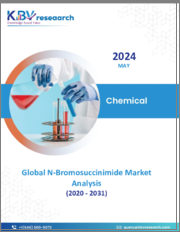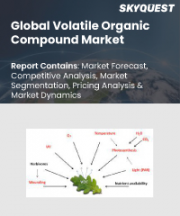
|
시장보고서
상품코드
1483513
N-Bromosuccinimide 시장 규모, 점유율, 동향 분석 리포트 : 함유량별, 용도별, 지역별, 전망과 예측(2024-2031년)Global N-Bromosuccinimide Market Size, Share & Trends Analysis Report By Content (Content 99%, and Content 98%), By Application (Pharmaceutical Industry, Pesticides Industry, and Others), By Regional Outlook and Forecast, 2024 - 2031 |
||||||
N-Bromosuccinimide(NBS) 시장 규모는 예측 기간 중 3.1%의 CAGR로 시장이 성장하며, 2031년까지 2,620만 달러에 달할 것으로 예상되고 있습니다. 2023년에 시장은 365.32톤 규모에 달하며, 12.0%(2020-2023년)의 성장을 달성했습니다.
그러나 NBS 생산의 주요 원료인 브롬은 주로 천연가스 추출 또는 염수정의 제품별로 얻을 수 있습니다. 따라서 브롬의 가용성은 본질적으로 천연가스 생산과 염수 광상의 존재와 관련이 있습니다. 천연가스 추출 또는 염수정 운영의 변동이나 제한은 브롬의 가용성에 직접적인 영향을 미치고 결과적으로 NBS의 생산에 영향을 미칩니다. 또한 브롬은 난연제, 석유 및 가스 시추 유체, 수처리 화학물질 등 화학 합성 이외의 다양한 산업에서 사용되고 있습니다. 이러한 산업과의 브롬 공급 경쟁은 NBS 생산의 가용성을 더욱 제한할 수 있습니다. 결론적으로, 브롬 매장량의 제한이 시장 성장을 저해하고 있습니다.
컨텐츠 전망
함량에 따라 시장은 99% 함량과 98% 함량으로 나뉘며, 2023년에는 98% 함량 부문이 N- 브로 모스 크신 이미 드 시장에서 43%의 매출 점유율을 차지했습니다. 함량으로 볼 때, 98% 함량 부문은 2023년에 167.14톤의 양을 기록할 것으로 예상되며, NBS는 유기 분자에 브롬 원자를 도입하기 위해 유기 합성 반응에서 브롬화제로 널리 사용되며, 98% 이상의 함량을 가진 고순도 NBS는 반응 조건과 제품 순도의 정확한 제어가 필수적인 복잡한 반응 조건과 제품 순도의 정확한 제어가 필수적인 복잡한 합성반응, 의약품 중간체, 정밀화학 제조에 선호되고 있습니다.
용도 전망
용도에 따라 시장은 제약 산업, 농약 산업 및 기타로 분류되며, 2023년에는 농약 산업 부문이 N- 브로 모스 퀴신 이미 드 시장에서 36%의 매출 점유율을 차지했습니다. 양적으로 농약 산업 부문은 2023년에 136.64톤의 화학 물질을 소비했으며, NBS는 브롬화 반응을 통해 다양한 농약 중간체 및 활성 성분을 합성하는 데 활용됩니다. 브롬화 화합물은 종종 생물학적 활성 증가, 안정성 향상, 표적 해충에 대한 효과 향상과 같은 바람직한 특성을 나타냅니다.
지역 전망
지역별로 시장은 북미, 유럽, 아시아태평양, 라틴아메리카, 중동 및 아프리카에 걸쳐 분석되었습니다. 아시아태평양은 2023년 N-Bromosuccinimide 시장에서 45%의 매출 점유율을 기록했습니다. 아시아태평양은 급속한 산업화와 경제 성장으로 제약, 농약, 특수 화학 등의 산업이 확대되고 있습니다. 이들 산업은 주로 제약 합성, 농약 제조 및 화학 합성에 적용되어 NBS의 중요한 소비자입니다.
주요 기업 리스트
- Nanjing Suru Chemical Co., Ltd.
- SAMUH LAXMI CHEMICALS (BOM) P. LTD. (Anron Chemicals Co. Group)
- Purecha Group
- Jiangxi Dasuo Chemical Co., Ltd.
- Resins and Allied Products
- Zhejiang Kente Catalysts Technologies Co., Ltd.
- HALIDES CHEMICALS PVT. LTD.
- Mody Chemi-Pharma Limited
N-Bromosuccinimide 시장 보고서 세분화
목차
제1장 시장 범위와 조사 방법
- 시장의 정의
- 목적
- 시장 범위
- 세분화
- 조사 방법
제2장 시장 요약
제3장 시장 개요
- 서론
- 개요
- 시장 구성과 시나리오
- 개요
- 시장에 영향을 미치는 주요 요인
- 시장 촉진요인
- 시장 억제요인
- 시장 기회
- 시장이 해결해야 할 과제
- Porter's Five Forces 분석
제4장 세계 시장 : 함유량별
- 세계의 함유량 99% 시장 : 지역별
- 세계의 함유량 98% 시장 : 지역별
제5장 세계 시장 : 용도별
- 세계의 제약 산업 시장 : 지역별
- 세계의 농약 산업 시장 : 지역별
- 세계의 기타 시장 : 지역별
제6장 세계 시장 : 지역별
- 북미
- 북미 시장 : 국가별
- 미국
- 캐나다
- 멕시코
- 기타 북미 지역
- 북미 시장 : 국가별
- 유럽
- 유럽 시장 : 국가별
- 독일
- 영국
- 프랑스
- 러시아
- 스페인
- 이탈리아
- 기타 유럽 지역
- 유럽 시장 : 국가별
- 아시아태평양
- 아시아태평양 시장 : 국가별
- 중국
- 일본
- 인도
- 한국
- 호주
- 말레이시아
- 기타 아시아태평양
- 아시아태평양 시장 : 국가별
- 라틴아메리카·중동 및 아프리카
- 라틴아메리카·중동 및 아프리카 시장 : 국가별
- 브라질
- 아르헨티나
- 아랍에미리트
- 사우디아라비아
- 남아프리카공화국
- 나이지리아
- 기타 라틴아메리카·중동 및 아프리카
- 라틴아메리카·중동 및 아프리카 시장 : 국가별
제7장 기업 개요
- Nanjing Suru Chemical Co, Ltd.
- Samuh laxmi chemicals(Bom) P Ltd.(Anron Chemicals Co. Group)
- Purecha Group
- Jiangxi Dasuo Chemical Co, Ltd.
- Resins and Allied Products
- Zhejiang Kente Catalysts Technologies Co, Ltd.
- Halides Chemicals Pvt Ltd.
- Mody Chemi-Pharma Limited
제8장 N-Bromosuccinimide 시장의 성공 필수 조건
KSA 24.06.03The Global N-Bromosuccinimide Market size is expected to reach $26.2 million by 2031, rising at a market growth of 3.1% CAGR during the forecast period. In the year 2023, the market attained a volume of 365.32 Tonnes experiencing a growth of 12.0% (2020-2023).
The North American region is at the forefront of advancements in chemical synthesis technologies, including bromination reactions facilitated by NBS. Thus, the North American region would acquire nearly 25% of the total market share by 2031. Also, the US market would consume 79.31 tonnes of this chemical by 2031. Researchers and chemists in academia, government institutions, and private companies are constantly exploring new synthetic methodologies and innovative applications of NBS in organic synthesis. This drive for innovation and efficiency contributes to the increasing demand for NBS in North America.
Chemical synthesis encompasses a broad range of reactions and transformations aimed at producing desired organic molecules and compounds. NBS finds applications in numerous synthetic methodologies, including halogenation, oxidation, substitution, and cyclization reactions. Moreover, chemical synthesis is instrumental in the development of advanced materials such as polymers, nanomaterials, and organic semiconductors with tailored properties and functionalities. NBS facilitates the modification of material surfaces, incorporation of bromine functionalities, and synthesis of brominated polymers with enhanced properties. In conclusion, expansion of chemical synthesis is driving the growth of the market. Additionally, Lithium-ion batteries are widely used in various applications, including electric vehicles (EVs), renewable energy storage systems, and consumer electronics, due to their high energy density, long cycle life, and environmental friendliness. NBS is employed in the synthesis of electrolyte materials, such as lithium bromide derivatives, which are crucial components of lithium-ion battery electrolytes. NBS-derived electrolyte additives offer opportunities for battery manufacturers to enhance battery performance parameters such as energy density, power output, and thermal stability. Thus, rising demand from the energy storage sector is propelling the growth of the market.
However, Bromine, a key raw material for the production of NBS, is primarily obtained as a byproduct of natural gas extraction or brine wells. The availability of bromine is thus inherently tied to the production of natural gas and the presence of brine deposits. Any fluctuations or limitations in natural gas extraction or brine well operations directly affect the availability of bromine, consequently impacting the production of NBS. Also, bromine is utilized in various industries beyond chemical synthesis, including flame retardants, oil and gas drilling fluids, and water treatment chemicals. The competition for bromine supply from these industries can further constrain its availability for NBS production. In conclusion, limited availability of bromine reserves are hampering the growth of the market.
Content Outlook
Based on content, the market is divided into content 99 and content 98. In 2023, the content 98 segment acquired a 43% revenue share in the N-bromosuccinimide market. In terms of volume, the content 98 segment would register a volume of 167.14 tonnes in 2023. NBS is widely used as a brominating agent in organic synthesis reactions to introduce bromine atoms into organic molecules. High-purity NBS with a content of 98% or higher is preferred for complex synthesis reactions, pharmaceutical intermediates, and fine chemical manufacturing, where precise control over reaction conditions and product purity is essential.
Application Outlook
On the basis of application, the market is segmented into pharmaceutical industry, pesticides industry, and others. In 2023, the pesticides industry segment attained a 36% revenue share in the N-bromosuccinimide market. In terms of volume, the pesticides industry segment consumed 136.64 tonnes of this chemical in 2023. NBS is utilized in the synthesis of various pesticide intermediates and active ingredients through bromination reactions. Brominated compounds often exhibit desirable properties such as increased biological activity, enhanced stability, and improved efficacy against target pests.
Regional Outlook
Region-wise, the market is analyzed across North America, Europe, Asia Pacific, and LAMEA. The Asia Pacific region witnessed 45% revenue share in the N-bromosuccinimide market in 2023. The Asia Pacific region is experiencing rapid industrialization and economic growth, leading to the expansion of industries such as pharmaceuticals, agrochemicals, and specialty chemicals. These industries are significant consumers of NBS, primarily due to its applications in drug synthesis, pesticide manufacturing, and chemical synthesis.
List of Key Companies Profiled
- Nanjing Suru Chemical Co., Ltd.
- SAMUH LAXMI CHEMICALS (BOM) P. LTD. (Anron Chemicals Co. Group)
- Purecha Group
- Jiangxi Dasuo Chemical Co., Ltd.
- Resins and Allied Products
- Zhejiang Kente Catalysts Technologies Co., Ltd.
- HALIDES CHEMICALS PVT. LTD.
- Mody Chemi-Pharma Limited
Global N-Bromosuccinimide Market Report Segmentation
By Content (Volume, Tonnes, USD Million, 2020-31)
- Content 99%
- Content 98%
By Application (Volume, Tonnes, USD Million, 2020-31)
- Pharmaceutical Industry
- Pesticides Industry
- Others
By Geography (Volume, Tonnes, USD Million, 2020-31)
- North America
- US
- Canada
- Mexico
- Rest of North America
- Europe
- Germany
- UK
- France
- Russia
- Spain
- Italy
- Rest of Europe
- Asia Pacific
- China
- Japan
- India
- South Korea
- Australia
- Malaysia
- Rest of Asia Pacific
- LAMEA
- Brazil
- Argentina
- UAE
- Saudi Arabia
- South Africa
- Nigeria
- Rest of LAMEA
Table of Contents
Chapter 1.Market Scope & Methodology
- 1.1Market Definition
- 1.2Objectives
- 1.3Market Scope
- 1.4Segmentation
- 1.4.1Global N-Bromosuccinimide Market, by Content
- 1.4.2Global N-Bromosuccinimide Market, by Application
- 1.4.3Global N-Bromosuccinimide Market, by Geography
- 1.5Methodology for the research
Chapter 2.Market at a Glance
- 2.1Key Highlights
Chapter 3.Market Overview
- 3.1Introduction
- 3.1.1Overview
- 3.1.1.1Market Composition and Scenario
- 3.1.1Overview
- 3.2Key Factors Impacting the Market
- 3.2.1Market Drivers
- 3.2.2Market Restraints
- 3.2.3Market Opportunities
- 3.2.4Market Challenges
- 3.3Porter Five Forces Analysis
Chapter 4.Global N-Bromosuccinimide Market by Content
- 4.1Global Content 99% Market by Region
- 4.2Global Content 98% Market by Region
Chapter 5.Global N-Bromosuccinimide Market by Application
- 5.1Global Pharmaceutical Industry Market by Region
- 5.2Global Pesticides Industry Market by Region
- 5.3Global Others Market by Region
Chapter 6.Global N-Bromosuccinimide Market by Region
- 6.1North America N-Bromosuccinimide Market
- 6.1.1North America N-Bromosuccinimide Market by Content
- 6.1.1.1North America Content 99% Market by Region
- 6.1.1.2North America Content 98% Market by Region
- 6.1.2North America N-Bromosuccinimide Market by Application
- 6.1.2.1North America Pharmaceutical Industry Market by Country
- 6.1.2.2North America Pesticides Industry Market by Country
- 6.1.2.3North America Others Market by Country
- 6.1.3North America N-Bromosuccinimide Market by Country
- 6.1.3.1US N-Bromosuccinimide Market
- 6.1.3.1.1US N-Bromosuccinimide Market by Content
- 6.1.3.1.2US N-Bromosuccinimide Market by Application
- 6.1.3.2Canada N-Bromosuccinimide Market
- 6.1.3.2.1Canada N-Bromosuccinimide Market by Content
- 6.1.3.2.2Canada N-Bromosuccinimide Market by Application
- 6.1.3.3Mexico N-Bromosuccinimide Market
- 6.1.3.3.1Mexico N-Bromosuccinimide Market by Content
- 6.1.3.3.2Mexico N-Bromosuccinimide Market by Application
- 6.1.3.4Rest of North America N-Bromosuccinimide Market
- 6.1.3.4.1Rest of North America N-Bromosuccinimide Market by Content
- 6.1.3.4.2Rest of North America N-Bromosuccinimide Market by Application
- 6.1.3.1US N-Bromosuccinimide Market
- 6.1.1North America N-Bromosuccinimide Market by Content
- 6.2Europe N-Bromosuccinimide Market
- 6.2.1Europe N-Bromosuccinimide Market by Content
- 6.2.1.1Europe Content 99% Market by Country
- 6.2.1.2Europe Content 98% Market by Country
- 6.2.2Europe N-Bromosuccinimide Market by Application
- 6.2.2.1Europe Pharmaceutical Industry Market by Country
- 6.2.2.2Europe Pesticides Industry Market by Country
- 6.2.2.3Europe Others Market by Country
- 6.2.3Europe N-Bromosuccinimide Market by Country
- 6.2.3.1Germany N-Bromosuccinimide Market
- 6.2.3.1.1Germany N-Bromosuccinimide Market by Content
- 6.2.3.1.2Germany N-Bromosuccinimide Market by Application
- 6.2.3.2UK N-Bromosuccinimide Market
- 6.2.3.2.1UK N-Bromosuccinimide Market by Content
- 6.2.3.2.2UK N-Bromosuccinimide Market by Application
- 6.2.3.3France N-Bromosuccinimide Market
- 6.2.3.3.1France N-Bromosuccinimide Market by Content
- 6.2.3.3.2France N-Bromosuccinimide Market by Application
- 6.2.3.4Russia N-Bromosuccinimide Market
- 6.2.3.4.1Russia N-Bromosuccinimide Market by Content
- 6.2.3.4.2Russia N-Bromosuccinimide Market by Application
- 6.2.3.5Spain N-Bromosuccinimide Market
- 6.2.3.5.1Spain N-Bromosuccinimide Market by Content
- 6.2.3.5.2Spain N-Bromosuccinimide Market by Application
- 6.2.3.6Italy N-Bromosuccinimide Market
- 6.2.3.6.1Italy N-Bromosuccinimide Market by Content
- 6.2.3.6.2Italy N-Bromosuccinimide Market by Application
- 6.2.3.7Rest of Europe N-Bromosuccinimide Market
- 6.2.3.7.1Rest of Europe N-Bromosuccinimide Market by Content
- 6.2.3.7.2Rest of Europe N-Bromosuccinimide Market by Application
- 6.2.3.1Germany N-Bromosuccinimide Market
- 6.2.1Europe N-Bromosuccinimide Market by Content
- 6.3Asia Pacific N-Bromosuccinimide Market
- 6.3.1Asia Pacific N-Bromosuccinimide Market by Content
- 6.3.1.1Asia Pacific Content 99% Market by Country
- 6.3.1.2Asia Pacific Content 98% Market by Country
- 6.3.2Asia Pacific N-Bromosuccinimide Market by Application
- 6.3.2.1Asia Pacific Pharmaceutical Industry Market by Country
- 6.3.2.2Asia Pacific Pesticides Industry Market by Country
- 6.3.2.3Asia Pacific Others Market by Country
- 6.3.3Asia Pacific N-Bromosuccinimide Market by Country
- 6.3.3.1China N-Bromosuccinimide Market
- 6.3.3.1.1China N-Bromosuccinimide Market by Content
- 6.3.3.1.2China N-Bromosuccinimide Market by Application
- 6.3.3.2Japan N-Bromosuccinimide Market
- 6.3.3.2.1Japan N-Bromosuccinimide Market by Content
- 6.3.3.2.2Japan N-Bromosuccinimide Market by Application
- 6.3.3.3India N-Bromosuccinimide Market
- 6.3.3.3.1India N-Bromosuccinimide Market by Content
- 6.3.3.3.2India N-Bromosuccinimide Market by Application
- 6.3.3.4South Korea N-Bromosuccinimide Market
- 6.3.3.4.1South Korea N-Bromosuccinimide Market by Content
- 6.3.3.4.2South Korea N-Bromosuccinimide Market by Application
- 6.3.3.5Australia N-Bromosuccinimide Market
- 6.3.3.5.1Australia N-Bromosuccinimide Market by Content
- 6.3.3.5.2Australia N-Bromosuccinimide Market by Application
- 6.3.3.6Malaysia N-Bromosuccinimide Market
- 6.3.3.6.1Malaysia N-Bromosuccinimide Market by Content
- 6.3.3.6.2Malaysia N-Bromosuccinimide Market by Application
- 6.3.3.7Rest of Asia Pacific N-Bromosuccinimide Market
- 6.3.3.7.1Rest of Asia Pacific N-Bromosuccinimide Market by Content
- 6.3.3.7.2Rest of Asia Pacific N-Bromosuccinimide Market by Application
- 6.3.3.1China N-Bromosuccinimide Market
- 6.3.1Asia Pacific N-Bromosuccinimide Market by Content
- 6.4LAMEA N-Bromosuccinimide Market
- 6.4.1LAMEA N-Bromosuccinimide Market by Content
- 6.4.1.1LAMEA Content 99% Market by Country
- 6.4.1.2LAMEA Content 98% Market by Country
- 6.4.2LAMEA N-Bromosuccinimide Market by Application
- 6.4.2.1LAMEA Pharmaceutical Industry Market by Country
- 6.4.2.2LAMEA Pesticides Industry Market by Country
- 6.4.2.3LAMEA Others Market by Country
- 6.4.3LAMEA N-Bromosuccinimide Market by Country
- 6.4.3.1Brazil N-Bromosuccinimide Market
- 6.4.3.1.1Brazil N-Bromosuccinimide Market by Content
- 6.4.3.1.2Brazil N-Bromosuccinimide Market by Application
- 6.4.3.2Argentina N-Bromosuccinimide Market
- 6.4.3.2.1Argentina N-Bromosuccinimide Market by Content
- 6.4.3.2.2Argentina N-Bromosuccinimide Market by Application
- 6.4.3.3UAE N-Bromosuccinimide Market
- 6.4.3.3.1UAE N-Bromosuccinimide Market by Content
- 6.4.3.3.2UAE N-Bromosuccinimide Market by Application
- 6.4.3.4Saudi Arabia N-Bromosuccinimide Market
- 6.4.3.4.1Saudi Arabia N-Bromosuccinimide Market by Content
- 6.4.3.4.2Saudi Arabia N-Bromosuccinimide Market by Application
- 6.4.3.5South Africa N-Bromosuccinimide Market
- 6.4.3.5.1South Africa N-Bromosuccinimide Market by Content
- 6.4.3.5.2South Africa N-Bromosuccinimide Market by Application
- 6.4.3.6Nigeria N-Bromosuccinimide Market
- 6.4.3.6.1Nigeria N-Bromosuccinimide Market by Content
- 6.4.3.6.2Nigeria N-Bromosuccinimide Market by Application
- 6.4.3.7Rest of LAMEA N-Bromosuccinimide Market
- 6.4.3.7.1Rest of LAMEA N-Bromosuccinimide Market by Content
- 6.4.3.7.2Rest of LAMEA N-Bromosuccinimide Market by Application
- 6.4.3.1Brazil N-Bromosuccinimide Market
- 6.4.1LAMEA N-Bromosuccinimide Market by Content
Chapter 7.Company Profiles
- 7.1Nanjing Suru Chemical Co., Ltd.
- 7.1.1Company Overview
- 7.2Samuh laxmi chemicals (Bom) P. Ltd. (Anron Chemicals Co. Group)
- 7.2.1Company Overview
- 7.3Purecha Group
- 7.3.1Company Overview
- 7.4Jiangxi Dasuo Chemical Co., Ltd.
- 7.4.1Company Overview
- 7.5Resins and Allied Products
- 7.5.1Company Overview
- 7.6Zhejiang Kente Catalysts Technologies Co., Ltd.
- 7.6.1Company Overview
- 7.7Halides Chemicals Pvt. Ltd.
- 7.7.1Company Overview
- 7.8Mody Chemi-Pharma Limited
- 7.8.1Company Overview
















